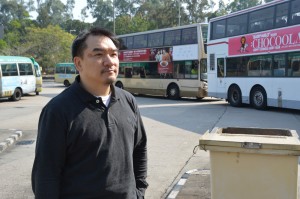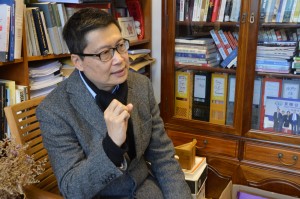The role of Hong Kong in developing Chinese civil society
by Thomas Chan and John Cheng
Chung To will never forget the night the mainland police stormed into his office at midnight, took his staff away –– including one who was pregnant –– to the police station and confiscated all the computers. Throughout his 16 years of work in mainland China, To has been under constant surveillance by authorities, his emails and his whereabouts closely monitored.

To is the founder of Chi Heng Foundation, a Hong Kong non-governmental organisation (NGO) working on the prevention of HIV/AIDS and supporting AIDS orphans in the Mainland. His experience illustrates the kind of challenges faced by NGOs working in the Mainland and has been shared to varying degrees by many others.
Before China’s policy of opening up and reform in the 1980s, there was no room for any organisations that were not under the direct control of the Communist Party. During the 1980s, non-profit projects and groups started to appear. Still, few in China had heard of NGOs until 1995 when the United Nations’ 4th World Conference on Women was held in Beijing. Parallel with the main conference, an NGO forum was held outside of the capital in the suburb of Huairou which was attended by tens of thousands of activists from all over the world. This inspired some Chinese to start thinking about setting up their own NGOs or working for the international NGOs that were already in China.
Throughout the 1990s, NGOs continued to grow despite the challenges of operating in a grey area and, in the aftermath of the Sichuan earthquake in 2008, thousands of local NGOs emerged to assist in relief work.
But while NGOs have become one of the driving forces of the development of civil society in China, the definition of an NGO in China is not as clear cut as in some other countries. Although NGOs are usually understood to be independent of any government, in China some are sponsored by the government. These are called government-organised NGOs, or GONGOs.
Official figures released by China’s Ministry of Civil Affairs state there are an estimated 490,000 civic organisations in China as of 2012. But Zhu Jiangang, director of the Institute for Civil Society of Sun Yat-sen University says that when the western definition of NGOs, which emphasises their autonomy, is applied, the real figure is closer to 3500.
The lack of a proper legal framework for NGOs means that it is almost impossible for them to register independently as legal entities. Instead they are required to find a government department to act as a patron. This has resulted in thousands of unregistered grassroots NGOs across China.
The inability to register makes NGOs vulnerable to crackdowns from authorities and affects their ability to obtain funding, hire staff and organise events. Those that choose to register as companies are liable to high taxes. Many NGOs also struggle with constant surveillance, interference and sometimes suppression from the police and local authorities.
It is in this context that Hong Kong NGOs have played and continue to play a part in the development of civil society in China. Sun Yat-sen University’s Zhu Jiangang believes Hong Kong plays a unique role in the development of Chinese NGOs due to its status as part of China. “Hong Kong has a relatively liberal [political] system. Many things which cannot be achieved in the Mainland can either be done in Hong Kong, or by Hong Kong people in China,” Zhu says.
The most direct assistance Hong Kong offers to Chinese NGOs is the sharing of skills and knowledge. Ada Pong Shuk-fan is the chief executive of Yellow House, a Hong Kong NGO which provides training for Chinese social organisations and university social work students. She describes China’s social work profession as “relatively backward”, as China only started to train its first batch of social workers in 2002. As the mainland programmes mainly emphasise theories, the students lack practical experiences and learning about proper values in carrying out social services.
Pong says Hong Kong NGOs provide training and workshops for mainland organisations on topics such as counselling and proposal writing, in order to equip them with the practical skills and actual working experiences needed for future work.
Apart from helping to train entry-level staff, Hong Kong NGOs also strive to nurture potential managers. Yellow House has trained their mainland staff to start up their own NGOs. Ao Xiang Social Service Centre (翱翔社會服務中心), which managed to register in 2013, is the first organisation to be set up by former Yellow House staff. “Our goal is to pass the light on, to train the trainer and to develop the social work profession,” Pong says. “We wish each of our colleagues could set up one NGO [in China].”
Hong Kong NGOs can also provide invaluable help to mainland NGOs which want to obtain funding. Ken Yau Tze-ken, lecturer at the Faculty of Social Science at the University of Hong Kong says: “Hong Kong organisations set up projects and seek cooperating partners in the Mainland. Given Hong Kong’s track record and credibility, it would be easier for mainland NGOs to get foreign funding.”
Yau says funding that comes either from Hong Kong or through Hong Kong would be regarded as “safer” for Chinese NGOs than from overseas.
Guangzhou, with its close proximity and linguistic and cultural ties with Hong Kong, is a good example of Hong Kong’s influence on the practices and development of Chinese NGOs. Green Point Environmental Welfare Association, a Guangdong-based grassroots NGO which focuses on environmental protection issues, experiences this influence first hand as the group shares an office with staff from Friends of the Earth (Hong Kong).
“Guangzhou has a really strong NGO and civil society atmosphere compared to other cities in China,” says Lucy You Lu-xi, assistant director of Green Point’s social contact department. “I think Guangzhou’s proximity to Hong Kong is a major reason contributing to that. Hong Kong’s practices and ideas can easily influence us.”

However, building a vibrant and flourishing civil society in China requires more than just providing technical training to develop local NGOs. Professor Chan Kin-man, director of the Centre for Civil Society Studies at the Chinese University of Hong Kong says it is just as important to change mindsets.
“NGOs should not be just about providing social service. It’s about how to promote civic participation and how to, ultimately, monitor the government and improve governance,” Chan says.
For Chan, helping to change mindsets is the key to Hong Kong’s role in helping to develop China’s civil society. “In China, most of the NGOs are controlled by the Communist Youth League of China,” Chan says. “But now southern cities mainly call volunteers ‘yigong’ (義工) (instead of zhiyuanzhe (志願者) because they are influenced by Hong Kong. The phenomenon is spreading to other places in China.”
Chan also recognises Hong Kong’s contribution in demonstrating a workable social management model for the Chinese government. “The Chinese government is willing to learn from Hong Kong…They appreciate how the Hong Kong government manages to maintain a friendly relationship with NGOs. NGOs won’t be too rebellious and their work helps lessen the government’s administrative burdens,” Chan explains.
But working in mainland China can be challenging for Hong Kong NGOs due to bureaucratic and political constraints, especially in recent years. Chung To, founder of Chi Heng Foundation, says the Chinese government’s suspicious attitude towards Hong Kong NGOs is a major hindrance to their work.
He points to the Chinese government’s fears in the wake of the so-called colour revolutions of Eastern Europe as a contributing factor. “Over the past decade, many authoritarian regimes were overthrown [with the help of] NGOs which are allegedly supported by foreign forces. In view of this, the Chinese government is worried that some foreign forces may conspire with Hong Kong NGOs to create trouble,” he explains.
It is especially hard for Hong Kong NGOs that work on advocacy and campaigning projects in the Mainland. The Chinese government adopts a two-pronged approach to both local and non-local NGOs. While they may encourage and even provide funding for local service-type NGOs, those who attempt to advocate for policy changes and human rights are strictly monitored, controlled and even prohibited.
“Sometimes all our volunteers would be detained overnight in the police station after we distribute condoms in parks, just because a new police officer is in charge [of the area],” To recalls. “Such incidents happen even today.”
The environmental group Greenpeace, which has worked on controversial issues like the marketing of genetically modified rice in China, has also experienced similar treatment. “The government would call us and ask us not to hold press conferences but, usually, we would carry on. They would then put pressure on hotels and tell them not to rent us rooms,” says Fung Ka-keung, director of organisational support and regional development of Greenpeace.

Another obstacle to the work of Hong Kong NGOs in China is the Chinese government’s ever-changing attitude towards them. In 2012, the registration process for NGOs was simplified in cities like Beijing and Guangzhou, but the easing of rules governing registration may just be giving the illusion that the government is loosening its control. Some believe registration actually creates difficulties for NGOs because they are then forbidden from receiving foreign funding after registration.
“Our work in the Mainland is like going back and forth between different government departments and enterprises, striving to push the boundary and making our work more effective,” Fung says.
Despite all the challenges, many still see hope for the future of China’s civil society. Wang Yong, project coordinator of the Centre for Civil Society Studies at the Chinese University of Hong Kong, is delighted to see the rise of civic awareness in mainland China. She predicts that despite twists and turns along the way, the level of development of civil society in China will continue to grow in the long run.
Howard Liu Hung-to, China programme director of Oxfam Hong Kong, is also optimistic about the future of Hong Kong NGOs in China. “Hong Kong [NGOs] should not be afraid of the Chinese government and think of it as a monolithic block,” he says. “Many policies require cooperation with the Chinese government and, although progress is slow, Hong Kong [NGOs] can influence them.”
Liu hopes that eventually the interaction between civil societies in Hong Kong and mainland China will not be so one-sided: while Hong Kong shares its experiences with China, it can also learn from good cases in China, he says. He illustrates this with the example of Shengli Village, a remote village in Sichuan Province which was flattened by the 2008 earthquake. In 2009, the villagers were able to decide on democratic issues of their village through voting. They planned the allocation of resources and budgeting, and monitored the reconstruction of the 3.6 km access road to their community.
“If such a remote village in the Mainland can do that [democracy], Hong Kong should also have more space and confidence to do so,” Liu says.
Edited by Frances Sit











































